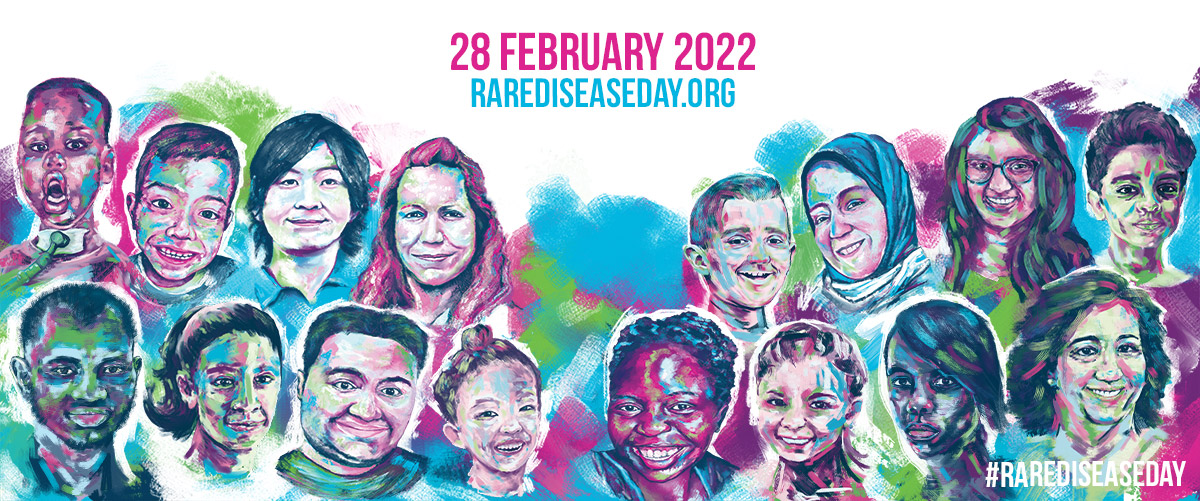
CONNECTING THE WORLDWIDE RARE DISEASE COMMUNITY WITH 100 DAYS TO RARE DISEASE DAY
20 November 2021, Paris
Today marks the launch of the global awareness campaign for the over 300 million people living with a rare disease worldwide – 100 days ahead of Rare Disease Day which will take place on 28 February 2022.
EURORDIS-Rare Diseases Europe and over 60 National Alliance patient organisation partners invite everyone to join us in bringing the entire rare disease community together to launch the campaign for the 15th Rare Disease Day.
This year, we are sharing 16 individual stories of people living with a rare disease from all around the world. The stories of Reza, Nitzia, Jelena, Shambhavu, Zixuan, Tsepiso, Wafic, Syafiq, Regina, Vasco, Nada, Taka, Angelina, Harvey, JK, and Tristan aim to show that while each rare diseases is rare, as a community we share a lot.
We are proud to announce that the first batch of high-quality digital promotional materials are available now on the brand new Rare Disease Day website. These materials will be adaptable for all languages, allowing the global patient community to relay patient stories from around the world across diseases, borders and cultures.
This year, we are also producing a children’s storybook aiming to educate and inform children aged 5-8 about rare diseases. Thanks to our National Alliance partners and volunteer translators, this will be available in over 20 languages and will form part of our school’s toolkit that will be implemented in schools and youth groups all around the world.
Following last year’s successful Global Chain of Lights, which saw over 550 buildings illuminated in 38 countries, we are once again calling on the rare disease community to participate. This year, as well as lighting up monuments in your city, we are also inviting the community to light their homes in the Rare Disease Day colours on 28 February 2022 in our #LightUpForRare campaign. It is our hope that this will allow even more people to participate in Rare Disease Day and enable the powerful message of the campaign to reach even more people.
Every year this global, patient-led awareness campaign brings together millions worldwide in solidarity with the 300 million people living with a rare disease. In 2021, thousands of events took place in over 100 countries, mobilising people living with a rare disease and their families, healthcare professionals, policy and decision makers, and industry and company representatives. We hope that this will grow even more in 2022!
How you can get involved
- Download our adaptable materials and share them with your networks! Remember to use #RareDiseaseDay.
- Plan an event or a digital event and post it on our brand new interactive map.
- Share your story with the rare disease community on our website.
- Participate in our global chain of lights by learning how to illuminate buildings in your area using our toolkit, or get ready to light up at home. We invite you to post participation on our interactive map so that our message of solidarity shines brightly all around the world.
- Download our Schools Toolkit to find out more about how you can explain rare diseases to children aged 5-8.
- Call on policy makers and partner with a local patient organisation to make the community voices heard!
Visit rarediseaseday.org for the full set of information and details on how to participate.
Shape History is the marketing agency that has produced the creative and adaptable materials for the campaign.
Contact
Lara Chappell, Strategic Communications and Marketing Director, Head of Awareness, Public Engagement and Events, EURORDIS-Rare Diseases Europe
About Rare Disease Day
A community-led campaign, Rare Disease Day was launched by EURORDIS-Rare Diseases Europe and its Council of National Alliances in 2008 and brings together millions of people in solidarity.
EURORDIS coordinates the global community in organising Rare Disease Day, which takes place on the last day of February each year to raise awareness of the impact that rare diseases have on over 300 million people around the world. #RareDiseaseDay
EURORDIS-Rare Diseases Europe and the over 60 National Alliance patient organisation partners
EURORDIS-Rare Diseases Europe organises the international patient community and produces the campaign elements for Rare Disease Day with over 60 National Alliance patient organisation partners. EURORDIS is a unique, non-profit alliance of over 900 rare disease patient organisations from 70+ countries that work together to improve the lives of the 30 million people living with a rare disease in Europe. By connecting patients, families and patient groups, as well as by bringing together all stakeholders and mobilising the rare disease community, EURORDIS strengthens the patient voice and shapes research, policies and patient services. Follow @eurordis or see the EURORDIS Facebook page. For more information visit eurordis.org.
About rare diseases
The European Union considers a disease as rare when it affects less than 1 in 2,000 citizens. Over 6,000 different rare diseases have been identified to date affecting an estimated 30 million people in Europe and 300 million worldwide. 72% of rare diseases are genetic whilst others are the result of infections (bacterial or viral), allergies and environmental causes, or are degenerative and proliferative. 70% of those genetic rare diseases start in childhood.
Due to the low prevalence of each disease, medical expertise is rare, knowledge is scarce, care offerings inadequate and research limited. Despite their great overall number, rare disease patients are the orphans of health systems, often denied diagnosis, treatment and the benefits of research.
